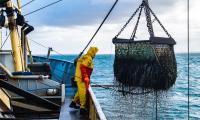Launching a lifeline: guiding fisheries towards Human Rights Due Diligence

In an effort to empower companies within the fisheries value chain, the Danish Institute for Human Rights has unveiled comprehensive guidance designed to demystify and facilitate the process of human rights due diligence.
Fish and seafood are pivotal in addressing the nutritional needs of a growing global population. With seafood consumption per capita more than doubling since the 1960s, the fisheries sector has grown, providing millions with livelihoods. In 2020, an estimated 40 million individuals were directly engaged in this vibrant sector worldwide.
However, the sector's expansion is not without its challenges. It is intertwined with significant human rights concerns that companies must assess and address. The impending Directive on Corporate Sustainability Due Diligence (CSDDD) by the European Union underscores this responsibility, categorising fisheries as a high-risk sector. The directive mandates companies to rigorously identify, prevent, and mitigate their negative impacts on human rights and the environment.
Our new guidance supports companies in navigating the CSDDD's expectations, enabling them to convert their business operations in the fisheries sector into catalysts for human rights enhancement. It provides practical advice on applying the UN Guiding Principles on Business and Human Rights within the fisheries sector and identifies key human rights and environmental issues across the value chain. Among these are:
- The prevalence of forced labour, modern slavery, child labour, and other exploitative practices, including abuse and inadequate wages and working conditions, throughout the value chain.
- The potential for fishing infrastructure to negatively affect local communities and small-scale fishers' livelihoods and wellbeing.
- The environmental and community impact of overfishing, particularly on local, small-scale, and artisanal fisheries' access to resources.
- The critical need for proper health and safety measures to protect workers, local communities, and consumers, preventing accidents and health hazards.
- The challenges of fraud and mislabelling in fish products, posing risks to sustainable seafood production and consumer safety. While certification standards may respond to consumer demands for sustainability verification, they often overlook labour and human rights issues.
The full guidance is available on: A Human Rights Due Diligence guide for companies in the fisheries value chain | The Danish Institute for Human Rights
